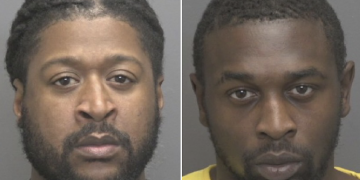On July 6, Christi J. Bennett drove her car into a crowd of people protesting on Walnut Street. According to the Indiana Daily Student, Bennett drove for two blocks with two protesters on the hood of her car before turning, which flung the protesters from the vehicle.
Representatives of the state prosecution and Bennett’s defense are scheduled to appear in a pretrial conference at 1:45 p.m. on April 27, according to court records. According to the Monroe County Circuit Court Rules and Procedures, the defendant is required to appear at all pretrial conferences unless they are excused by the court. However, Bennett was not present at a pretrial conference on Nov 9.
According to a previous Indiana Daily Student report, Bennett drove her car into a crowd of protesters who were demonstrating in response to the alleged attack of Vauhxx Booker who was physically and verbally attacked by men with confederate flags near Lake Monroe on Fourth of July this summer according to a previous report from the Indiana Daily Student.
According to the IDS, one of the protesters, Geoff Stewart, suffered minimal injuries and did not require medical attention while the other protester, Chaz Mottinger, who was unresponsive at the scene, received a concussion.
Her initial hearing on July 17 was canceled after a waiver of initial appearance was filed and a pretrial conference was scheduled for Sep. 14, according to court records.
Pretrial conferences address information related to trial proceedings, according to Indiana Code 35-36-8-3. Conferences address information about witnesses, testimonial and physical evidence, motions, procedure, anticipated necessity of further discovery, and any proposed plea or sentencing agreement, according to Monroe Circuit Court Rules and Procedures.
Representatives from both Bennett’s defense and the state’s prosecuting team have appeared in four pretrial conferences since the first conference in September. On Nov. 9, 2020, Bennett’s defense filed a Motion and Order on Continuance, which waived Criminal Rule 4, which states a defendant cannot be held in jail on a charge without a trial for more than six months and can’t be held on or answer to criminal charges for over a year. The defense has waived it multiple times since then, according to court records.
















































































